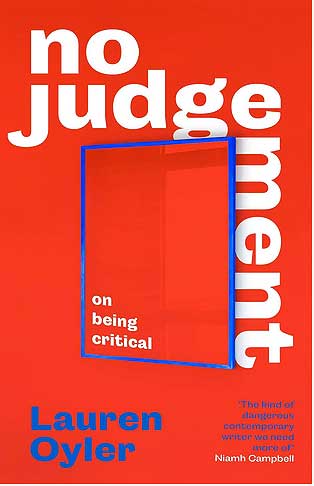
No Judgement. On Being Critical, Lauren Oyler (Virago)
The reviews I read about this book suggested it was astute, witty and readable, which the cover blurb concurs with, suggesting it is ‘brisk’ and ‘honest’, and that Oyler is ‘smart and unafraid’. Unafraid of what? I wonder. Certainly not of endlessly going on and on about her subjects; and certainly not of sitting on the fence and offering up platitudes and vagueness to readers.
Oyler does not strike me as a critic. Instead she is a commentator, who offers summaries and overviews, yet does little with the information she assembles and then offers to readers. She seems far too close to her subjects, particularly when it comes to publishing, the book trade, reviewing and the internet. When considering the last of these she seems so ‘networked’ that she is unable to understand that most of the problems and issues she talks about are easily solvable: don’t use social media, don’t pick fights with or provoke those you don’t know or only know online, and take everything on the internet with a pinch of salt.
You see, I don’t care if book bloggers aren’t as good as those who review for reputable journals and newspapers, that critics aren’t always right, that some writers are not nice people, or that some books aren’t very well written. I discovered many decades back that you don’t have to read anything you don’t want to or engage with critics you don’t trust. You can make your own mind up. You can turn the television and radio, even your computer, off. You don’t have to give out your mobile number or your email address, you don’t have to post your photo anywhere or construct a persona on Instagram… There are (probably) real people living next door to you, and if you are involved in art/writing/books/music (etc. – delete and substitute as applicable) you probably know who to send letters or emails to, to discuss work in progress, to share recommendations and ideas with, to consult and befriend, to collaborate with.
In a chapter entitled ‘Why Do You Live Here?’ Oyler discusses Berlin, how she bought expectations along with herself to the city, first as a visitor, now as a resident. ‘I set out in part to explain what I like, or love’, she writes, noting that when walking down streets she has now known for 11 years she still ‘often think[s] […] the same thing I’ve always thought during these moments: that I wished I lived here. Absurd, because I do.’ Umm, well, yes. I think we all have moments like that, have all become ‘attached to images and routines that may seem to others insignificant or cliché.’ Which is perhaps, why we don’t go on about them?
The opposite is also true, of course: we can be nostalgic about where we grew up and used to live (in my case London); wish that we could actually become residents of cities we have visited often enough to know our way around and pretend we are not visitors (New York, Tuscany, Glasgow, for me); and wonder at how we all used to know places we spent months or years living in (Coventry, Crewe and Exeter) but now have mostly forgotten about.
We are all different, and as Oyler notes, ‘Our minds insert clear solutions to foggy problems’. Most of what Oyler writes about seems blindingly obvious, is called being human, but she is able to fog it up because she is too angsty, too engaged to realise she is simply obfuscating what is already clear. She is obsessed, often self-obsessed, and unable to step back and see often simple solutions, or the fact she is woffling on about nothing. For page after page after page.
Rupert Loydell
.
